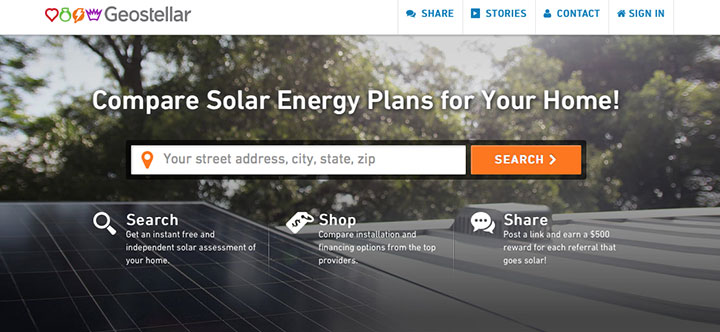 While it took roughly one year for the U.S. Securities and Exchange Commission (SEC) to put the rules in place, the Jumpstart Our Business Startups (JOBS) Act, which was signed into law back in April 2012 by President Obama, marked an exciting moment for many in the startup space. Today it’s become clear the JOBS Act could have significant benefits for entrepreneurs as the law democratizes access to capital and brings the process of raising funds into the Internet Age by allowing startups to advertise that they are raising money, as well as permitting them to sell equity to qualified investors from the general public who respond to these promotions. Seemingly, the law will encourage more entrepreneurs to start their own business as they’ll have quicker and easier access to capital. One entrepreneur poised to leverage the new law is David Levine, CEO of home solar energy marketplace Geostellar, which has turned to crowdfunding after a rare management-led recapitalization of his company. “Normally at this stage we’d be raising a Series C round from institutional investors,” said Levine. Instead, Levine, members of the management team, along with some close allies invested in Geostellar and, with the support of the Board of Directors and the stockholders, converted the outstanding shares from preferred to common stock. “That gave us the ability to crowdfund a new round with individual investors at a lower valuation, without triggering the typical provisions of preferred stock,” Levine added. “So now we’re raising a Series A round, but we get to do so with the assets and capabilities of a much more mature company.” Based in the Washington, D.C. area, Geostellar has built a robust solar marketplace on a sophisticated big-data simulations platform with the $16 million the company has raised since it was incorporated in Feb. 2010. Levine said now is the right time to launch a crowdfunding campaign with Return On Change because they can leverage the passion of the homeowners on Geostellar’s rapidly-expanding platform. Sherwood Neiss, principal at Crowdfund Capital Advisors, was instrumental in developing the framework to legalize debt and equity crowdfunding. As an entrepreneur, he faced the same funding void as many of his peers and decided to do something about it. “Entrepreneurs and small business owners who were previously shut out of the capital markets now have access to millions of potential investors and billions of dollars,” said Neiss. “This is going to foster an era of entrepreneurship and innovation unlike any we’ve ever seen.” Pre-JOBS Act, startups were raising capital under laws that were 80 years old. These only allowed the wealthiest one percent to partake in investment programs and precluded tools like the Internet and social media. The process was antiquated and limited. “Without question, 2014 will be a big year for entrepreneurs,” said Neiss. “The majority will fail to hit their funding targets because they don’t take the time to learn how to crowdfund. Those that do, however, will not only benefit from funding, but also from an engaged group of investors who will become brand advocates.” Geostellar’s Levine is excited to go direct to this new source of investment capital. “When we were pitching to potential investors, you have to continually explain what you are going to do and why it’s important,” he said. “Our crowdfunding campaign lets us go directly to the people using our service, who already understand why it is significant and groundbreaking.” This is not Levine’s first rodeo. He’s an experienced entrepreneur, having also founded a mortgage loan trading platform as well as a video game technology company – both of which were conceived and funded before the advent of online crowd investing. Having raised capital in the traditional manner, from venture capital funds and strategic investors, Levine says crowdfunding is a very different, more positive experience. He can appeal directly to a broad array of individuals and get a decision, whether yes or no, on the information provided, without the bureaucracy of an investment committee or corporate hierarchy. The individuals who express interest have varied business backgrounds, and serve as a valuable sounding board. Geostellar is seeking to raise $1 million through Return on Change and is currently 20 percent of the way there just two weeks into a 90-day campaign. Crowdfunding is ushering in a new era of entrepreneurs with more potential than ever. If Neiss’ prediction is correct, savvy entrepreneurs, like Levine, will turn to equity crowdfunding platforms like Rock the Post or Crowdfunder, Return on Change, and Wefunder to not only raise capital, but to build a very powerful marketing arm. This one-two-punch has the potential to create the most successful generation of startups — ever.
While it took roughly one year for the U.S. Securities and Exchange Commission (SEC) to put the rules in place, the Jumpstart Our Business Startups (JOBS) Act, which was signed into law back in April 2012 by President Obama, marked an exciting moment for many in the startup space. Today it’s become clear the JOBS Act could have significant benefits for entrepreneurs as the law democratizes access to capital and brings the process of raising funds into the Internet Age by allowing startups to advertise that they are raising money, as well as permitting them to sell equity to qualified investors from the general public who respond to these promotions. Seemingly, the law will encourage more entrepreneurs to start their own business as they’ll have quicker and easier access to capital. One entrepreneur poised to leverage the new law is David Levine, CEO of home solar energy marketplace Geostellar, which has turned to crowdfunding after a rare management-led recapitalization of his company. “Normally at this stage we’d be raising a Series C round from institutional investors,” said Levine. Instead, Levine, members of the management team, along with some close allies invested in Geostellar and, with the support of the Board of Directors and the stockholders, converted the outstanding shares from preferred to common stock. “That gave us the ability to crowdfund a new round with individual investors at a lower valuation, without triggering the typical provisions of preferred stock,” Levine added. “So now we’re raising a Series A round, but we get to do so with the assets and capabilities of a much more mature company.” Based in the Washington, D.C. area, Geostellar has built a robust solar marketplace on a sophisticated big-data simulations platform with the $16 million the company has raised since it was incorporated in Feb. 2010. Levine said now is the right time to launch a crowdfunding campaign with Return On Change because they can leverage the passion of the homeowners on Geostellar’s rapidly-expanding platform. Sherwood Neiss, principal at Crowdfund Capital Advisors, was instrumental in developing the framework to legalize debt and equity crowdfunding. As an entrepreneur, he faced the same funding void as many of his peers and decided to do something about it. “Entrepreneurs and small business owners who were previously shut out of the capital markets now have access to millions of potential investors and billions of dollars,” said Neiss. “This is going to foster an era of entrepreneurship and innovation unlike any we’ve ever seen.” Pre-JOBS Act, startups were raising capital under laws that were 80 years old. These only allowed the wealthiest one percent to partake in investment programs and precluded tools like the Internet and social media. The process was antiquated and limited. “Without question, 2014 will be a big year for entrepreneurs,” said Neiss. “The majority will fail to hit their funding targets because they don’t take the time to learn how to crowdfund. Those that do, however, will not only benefit from funding, but also from an engaged group of investors who will become brand advocates.” Geostellar’s Levine is excited to go direct to this new source of investment capital. “When we were pitching to potential investors, you have to continually explain what you are going to do and why it’s important,” he said. “Our crowdfunding campaign lets us go directly to the people using our service, who already understand why it is significant and groundbreaking.” This is not Levine’s first rodeo. He’s an experienced entrepreneur, having also founded a mortgage loan trading platform as well as a video game technology company – both of which were conceived and funded before the advent of online crowd investing. Having raised capital in the traditional manner, from venture capital funds and strategic investors, Levine says crowdfunding is a very different, more positive experience. He can appeal directly to a broad array of individuals and get a decision, whether yes or no, on the information provided, without the bureaucracy of an investment committee or corporate hierarchy. The individuals who express interest have varied business backgrounds, and serve as a valuable sounding board. Geostellar is seeking to raise $1 million through Return on Change and is currently 20 percent of the way there just two weeks into a 90-day campaign. Crowdfunding is ushering in a new era of entrepreneurs with more potential than ever. If Neiss’ prediction is correct, savvy entrepreneurs, like Levine, will turn to equity crowdfunding platforms like Rock the Post or Crowdfunder, Return on Change, and Wefunder to not only raise capital, but to build a very powerful marketing arm. This one-two-punch has the potential to create the most successful generation of startups — ever.
With JOBS Act Rules In Place, Geostellar Seeks To Crowdfund A Solar Energy Marketplace
By Techli
10 febrero, 2014









